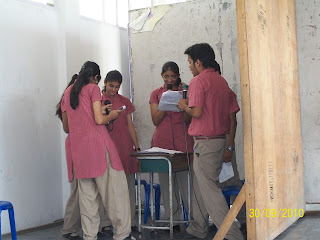Our formal school time-table content is insufficient to attain all that is required for an overall development of the student.In my class, I felt the need to focus on improving their public speaking, as an extra-mural activity involving language. Good habits of oral delivery mastered at school will be of value to my students. In their adult working years they may have to make formal presentations at meetings, seminars and all manner of negotiations.
Activities that provide students with
non-threatening opportunities to improve their public speaking skills help
develop learner confidence and language skills. What a wonderful gift to give
our students!
I had always been wary of public speaking
activities in language classrooms. I wondered about the relevance of oratory for my students' language needs and I doubted whether it would be possible to
encourage and motivate the students through such a difficult activity. One thing I was sure about - was that it had
to be in a different learning environment and it would work.
Sitting in the audience are not just any students. The students comprise of peers and their junior batch. This activity was a perfomance of only the top 2 teams and in front of a'learning ' audience.They were bonding not only with language but also with their seniors and learning too. It was challenging for them to try to do better than their seniors in the next year.Good habits of oral delivery as in the radio show, mastered at school will be of value to my students.
The radio show was designed in such a manner that these first timers got a 'private space' to themselves to perform as is done in a recording studio, Only therir voices would be audible to the audience and all their others movements and fallacies invisible!
When all the presentations had been made, I, as a teacher made
comments on their performances with the aim of helping students to improve their
performance. Correct usage of phrases, exact pronunciation of words, tempo of delivery
and audibility of voice were looked into.
The teacher’s attitude is of course vital. To err is human but we can all learn from our own errors and those of others. They were provided a good opportunity to speak and
others got a chance to learn through listening and observation.
This activity helps gain confidence and helps to express clearly and use english language effectively. It enables the students to improve in asking clear questions, and answering their questions audibily and appropriately.It also helps in speaking to a group of people in a particular manner intending to inform, influence or entertain listeners. Radio shows also help to remove reluctance to public speaking and inculcate teamwork spirit.- an important skill in public life too!





















